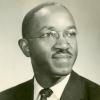Tell It All, Y'all
Cobbloviate
The Ol’ Bloviator was greatly honored to deliver this year’s Founder’s Day Lecture at the University of Georgia. His talk focused on humor and Southern cultural identity. The following little excerpt tackles the question of why ministers and religion are so often the butt of jokes in the so-called Bible Belt.
I first set foot in this hallowed structure[ the UGA Chapel] in September 1965 to attend a freshman orientation session presided over by none other than the University of Georgia's legendary dean of men, William Tate, who was both a great wit and an old-school practitioner of what is now known as “tough love.” As Dean Tate set me and several hundred of my classmates straight on the great many things that might bring his wrath down on anyone of us, he softened his stern admonitions with a number of disarming one-liners. The one I recall most vividly some 47 years later was his observation that the baby boomer-induced on-campus housing crunch would be mitigated at least a bit that year by the admission of a particularly large contingent of Baptists, who were typically so narrow that three of them could share a single bed. The ensuing sprinkle of no more than polite laughter suggested that his quip had gone right over most of the student heads in the Chapel that day. Still, as I look back on it now, I am struck by the “Southernness” of Dean Tate’s use of what he honestly believed was “insider” humor to signal to an auditorium filled with anxious 18-year-old boys that while he expected to be seen as an authority figure he hoped at least to be understood as an empathetic one.
A year before my first visit to the Chapel, a fellow named Lewis Grizzard had doubtless sat here listening to a similar and perhaps identical Dean Tate monologue. On his way to fame as a Southern humorist, Grizzard popularized a story that actually inspired the title for this little talk. Distressed by the steady shrinkage in both attendance and the contents of the offering plate, a minister vowed to light a fire under his complacent congregation by calling on them to make public confessions of their most egregious sins. “Come on now,” he demanded, “I want each and every one of you to tell it all,” and when the first congregant rose to confess to gambling away his paycheck, the preacher's response was “Tell It All, Brother! Tell It All!” And so it went, as one after another member of his disturbingly wayward flock offered a litany of shocking revelations about their drinking, (“Tell It All, Brother! Tell It All!”), fighting, (“Tell It All, Brother! Tell It All!”) and adultery, (“Tell It All, Brother! Tell It All!”) until finally there remained but one unburdened sinner, who, under a steady barrage from the pulpit of “Tell It All, Brother! Tell It All!”, rose hesitantly from the back pew to admit, “Well, preacher, I had sex with a goat last week,” leading the minister to exclaim without hesitation, “Damn, Brother! I don’t believe I’d a told that!”
I think the odds are pretty good that French philosopher and Nobel Laureate Henri Bergson never heard this joke, but he did insist that “to understand laughter, we must put it back into its natural environment, which is society, and above all we must determine the utility of its function, which is a social one… Laughter must have a social significance.” Apropos of Bergson’s remarks, the foregoing story seems to suggest that while many residents of the Bible Belt South may have indeed believed that God’s forgiving grace was boundless, their own definitely had its limits….
Although irreverence toward men of the cloth was hardly out of the ordinary among jokesters of either race, as the blues would also suggest, it was definitely pronounced among black men who suspected that ministers pursued their calling primarily to avoid hard manual labor while enjoying easy access to the good food and sexual favors provided by the female faithful. Sure enough, seeking likely candidates for the ministry, a pastor asked all the men who loved fried chicken more than anything to move to one side of the church and those who loved women more than anything to move to the other. When the young man left standing in the middle explained that he loved both equally well, the minister broke into a huge smile and shouted, “Come forward, Brother. You’ve been called to preach.”
It may seem incongruous that, in a region where Bibles are sold in tire stores and everyone is presumed either to have or be searching for “a church home,” so many jokes showed so little reverence for institutionalized religion, the clergy or even the admonitions of the Holy Scriptures. Although Dean Tate was a Methodist, he delivered his little dig at the Baptists knowing full well that their perceived dogmatism had long invited far sharper ridicule. His fellow Methodist Lewis Grizzard even observed that things must really be changing in the South, because the Baptists were finally starting to make eye contact with each other in the liquor store. In reality, the profusion of such jokes in the Bible-bound South simply illustrates the socially interpretive value of humor, which, by its inherently subversive nature, is typically directed at absolute taboos or iconic figures and precepts. Thus it provides invaluable clues about a society’s social and cultural sore spots, the places where its norms and constraints bind a little too tightly or the rough edges of its history have left a wound that resolutely refuses to be healed…
Having heard a few Founders Day lectures himself, the Ol’ Bloviator harbors no illusion that his was the best ever, but he can at least assert with complete assurance that his talk marked the first time in its 180-year history that a speaker has alluded to sex with a goat within the sacred confines of the University of Georgia Chapel. In retrospect, he is happy that his instincts told him not to circulate his remarks in advance, lest a raucous protest from the S.P.C.A. and P.E.T.A detract from the dignity of the occasion.
More by James C. Cobb
-

-

When Historians Made History Themselves
Cobbloviate
-










comments